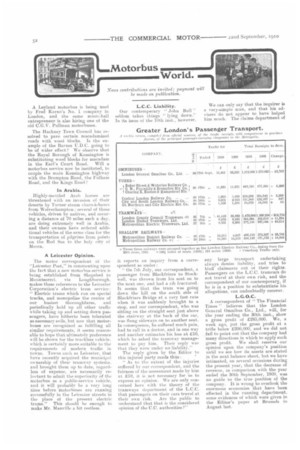A Leyland motorbus is being used by Fred Karno's No.
Page 8

If you've noticed an error in this article please click here to report it so we can fix it.
I. company in London, and the same music-hall entrepreneur is also hiring one of the old C.G.V. Pullman motorbuses.
The Hackney Town Council has resolved to pave certain macadamized roads with wood blocks. Is the example of the Barnes U.D.C. going to be of wider effect? We observe that the Royal Borough of Kensington is substituting wood blocks for macadam in the Earl's Court Road. Will a motorbus service now be instituted, to couple the main Kensington highway with the Brompton Road, the Fulham Road, and the Kings Road ?
In Arabia.
Highly-mettled Arab horses are threatened with an invasion of their deserts by Turner steam chars-h-bancs from Wolverhampton ; several of these vehicles, driven by natives, and covering a distance of 70 miles each a day, are doing extremely well in Arabia, and their owners have ordered additional vehicles of the same class for the transportation of pilgrims from points on the Red Sea to the holy city of Mecca.
A Leicester Opinion.
The motor correspondent of the "Leicester Post," in commenting upon the fact that a new motorbus service is being established from Shepshed to Mountsorrel, via Loughborough. makes these. references to the Leicester Corporation's electric tram service: " Electric trains which run on special tracks, and monopolize the centre of our busiest thoroughfares, and periodically hold up all other traffic while taking up and setting down passengers, have hitherto been tolerated as necessary evils, but now that motorbuses are recognized AN fulfilling all similar requirements, it seems reasonable to hope that ultimately preference will be shown for the trackless vehicle. which is certainly more suitable to the requirements of modern traffic in towns. Towns such as Leicester, that have recently acquired the municipal ownership of their tramway systems, and brought them up to date, regardless of expense, are necessarily reluctant to admit the superiority of the motorbus as a public-service vehicle, and it will probably be a very long time before motorbuses are running successfully in the Leicester streets in the place of the present electric trams." This should be enough to make Mr. Manville a bit restless.
it reports an inquiry from a correspondent as under :
" On 7th July, our correspondent, a passenger from Blackfriars to Stockwell, was thrown from his seat on to the next one, and had a rib fractured. It seems that the tram was going down the hill on the south side of Blackfriars Bridge at a very fast rate when it was suddenly brought to a stop, and our correspondent, who was sitting on the straight seat just above the stairway at the back of the car, was flung sideways on to another seat. In consequence, he suffered much pain, had to call in a doctor, and in one way and another estimates his loss at LDS, which he asked the tramway management to pay him. Their reply was that they were under no liability." The reply given by the Editor to this injured' party reads thus:
" As to the extent of the injuries suffered by our correspondent, and the fairness of the assessment made by him at £10, it is not necessary for us to express an opinion. .We are only concerned here with the theory of the tramways department of the L.C.C. that passengers on their cars travel at their own risk. Are the public to understand that that is the considered opinion of the C.C. authorities?" any large transport undertaking always denies liability, and tries to bluff claimants out of their rights. Passengers on the L.C.C. tramcars do not travel at their own risk, and the correspondent of our contemporary, if he is in a position to substantiate his allegations, can undoubtedly recover.
L.G.O.C.
A correspondent of "The Financial Times " believes that the London General Omnibus Co., Ltd., will, for the year ending the 30th inst. show a gross profit of 085,000. inst., a week ago, put the gross profit at a trifle below £200,000, and we did not fail to point out that the company had many directions in which to apply such gross profit. We shall reserve our opinion upon the company's position until we see how its assets are stated in the next balance sheet, but we have intimated, on several occasions during the present year, that the decrease of revenue, in comparison with the year ended the 30th September, 1900, was no guide to the true position of the company. It is wrong to overlook the enormous economies that have been effected in the running department, some evidences of which were given in the Editor's paper at Brussels in August last.
























